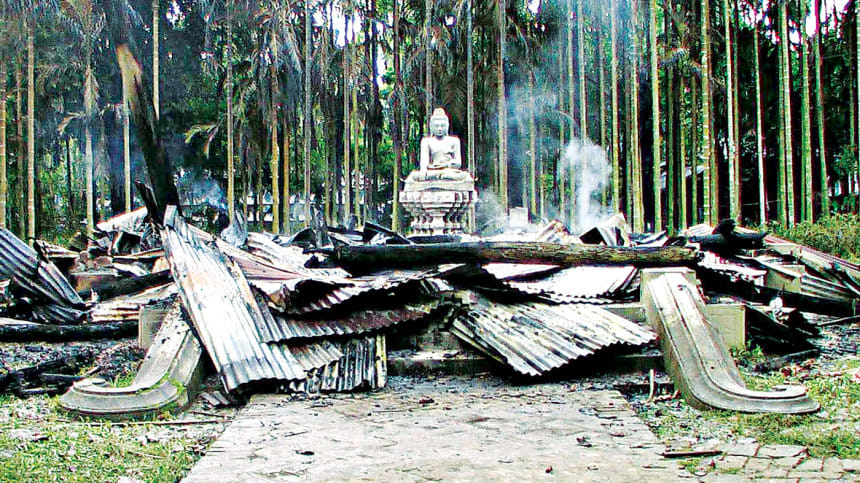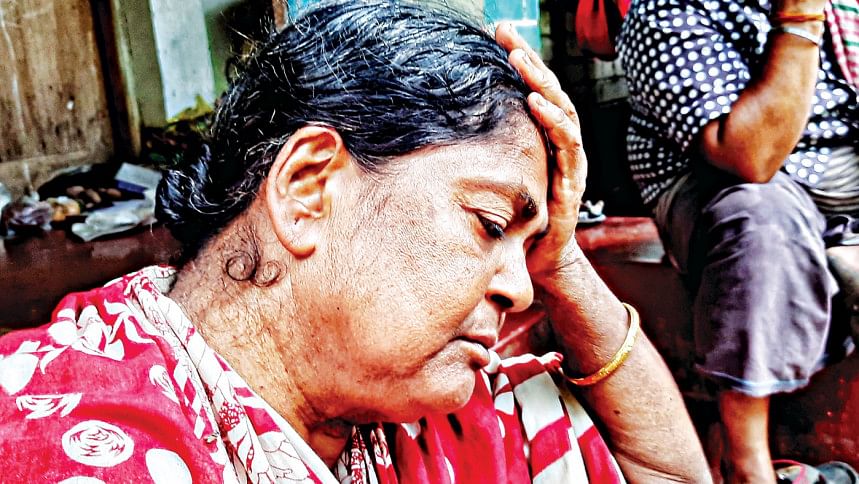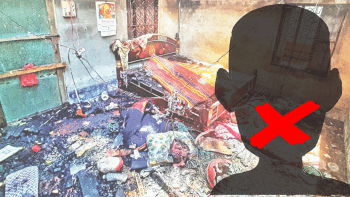Trend in communal violence: Collective silence spells disaster

Communal attack in Narail: a case filed against 250 unidentified people, three arrested (The Daily Star, July 18, 2022).
This is yet another disturbing headline that highlights a pattern of violence against minority communities.
Last year in October, incidents of communal attacks took place in Cumilla, Noakhali and Chandpur districts after a copy of the Holy Quran was found in a puja mandap in Cumilla. Nine months have gone by since the attacks that included arson and vandalism of Hindu temples and mandaps, yet investigations in most of the cases have not been completed. Some 439 identified and 5,700 unidentified people were accused in 51 cases filed in the three districts. Charge sheets were submitted in only three cases in Noakhali. Meanwhile probes in the remaining 48 cases (94 percent) were not completed in the last nine months (Prothom Alo, July 18, 2022).
Let's go back a little more, to March 2021 specifically. Twenty-two people were detained and 1,500 accused in a communal attack in Shalla of Sunamganj (Deutsche Welle, March 19, 2021). One thing seems to stand out in these reports. In each of these incidents, a large number of "unidentified" people are accused. But how do the police arrest these unidentified culprits? Obviously it is not possible. This only indicates the state's lack of any real interest in holding the attackers accountable and punishing them for their crimes.

There is little hope that justice will be done in the Narail attack. One wonders just how indifferent a state can be that it fails to provide minimum security to the Hindu community? One of Narail's victims, Dipali Rani Saha said, "After one group looted my house, another group turned up and burnt our house as they found nothing to loot. After failing to break into one of our rooms where we were hiding, they attacked the nearby temple and vandalised the idol".
This continued indifference and silence have created a culture of impunity for extremists to engage in communal violence. The result is a growing trend towards fanatical views among the religious majority.
The silence of the state and society allows communalism to spread through every medium, be it education, culture, literature or film -- creative fields we have always considered representing progressive and liberal views. Unfortunately, people associated with these fields do not speak up after an incident of communal violence. They are afraid. It seems if they speak up, they may end up in jail.
The state is responsible for failing to stop this growing communal mindset in society. When perpetrators go unpunished despite attacking the Hindu community time and again, it only encourages the fundamentalists. Sadly, when a pro-liberation war government made changes to the children's textbooks at the insistence of Hefajat-e Islam, hardliners only feel more confident and empowered. When the state is punishing the victims instead of the perpetrators, it makes extremists more aggressive. This is the root of all evil.
We have seen attacks in Ramu of Cox's Bazar; Nasirnagar of Brahmanbaria; Gobindaganj of Gaibandha; Patgram of Lalmonirhat; Muradnagar of Cumilla; Monpura of Bhola; Santhia of Pabna; Kaharol of Dinajpur; Tala of Satkhira; Mongla of Bagerhat; Gangachara of Rangpur; Mohonpur of Rajshahi; Satkania of Chattogram; Benapole of Jashore; Mohammadpur of Magura; Nageshwari of Kurigram; Borhanuddin of Bhola; Shalla of Sunamganj; Nanua Dighir Par of Cumilla; Sahapara of Narail -- the list is endless.
Has justice been served in any of those incidents? The answer is no. Interestingly, most of these communal attacks took place in the last 15 years. Since 2010, communal attacks have taken place based on false accusations of demeaning religion through Facebook posts. It's the same old script which was previously being used through loudspeakers before launching such attacks. And now the bigots use the latest technology to spread hate; they open a fake Facebook ID of a Hindu and post a status or comment demeaning Islam. However, those who created the fake IDs remain scot-free.
Based on that status or comment, violent attacks are launched. Incidents of looting houses, vandalising temples and businesses are common in those attacks. In some cases, incidents of sexual harassment and even rape also take place. However, during the attacks police, administration, ministers, lawmakers, bureaucrats -- all remain silent spectators. What happens next is filing of cases against the individuals accused of demeaning religion along with their family members. This pattern is followed in every incident. After the damage is done the government rushes to the area where attacks have taken place with relief materials and make efforts to rebuild the damaged houses. The local administration joins in as do the ministers. Lofty statements are issued and the media publishes the news.
This is the standard procedure for the last 15 years. None of the victims of false allegations like Rasraj, Uttam Barua and Biplab Chandra gave any status or comment that demeaned religion but they were nevertheless arrested. Considering the trend, a similar fate probably awaits Akash Saha of Digholiya village in Lohagora Upazila of Narail who is accused of posting something derogatory about religion on Facebook. We are all too familiar with this narrative of communal attacks, so is the government. But why is there no justice? Why does no one speak up when Hindus (or members of other minority communities) are attacked? It is because the state really doesn't want to address this. The truth is if there is political will it is possible to right any wrong. If a person unscrewing the nuts of the Padma bridge can be captured within 24 hours, why can't communal attackers be apprehended?
There is little hope that justice will be done in the Narail attack. One wonders just how indifferent a state can be that it fails to provide minimum security to the Hindu community? One of Narail's victims, Dipali Rani Saha said, "After one group looted my house, another group turned up and burnt our house as they found nothing to loot. After failing to break into one of our rooms where we were hiding, they attacked the nearby temple and vandalised the idol" (The Daily Star, July 17, 2022). The local MP woke up from his slumber only after this barbaric attack. When the attack was underway on July 15, people tried to contact him, his assistant informed that they were taking care of things. Is this how they "took care" of things?
The disconnect between people and lawmakers is all too obvious. Most of the MPs failed to show that they have a sense of public responsibility. Is it not because they came to power unopposed? This culture of total apathy towards the plight of minority communities must end. It is painful when the sufferer says, "They attacked us because we are Hindus" (The Daily Star, 17 July, 2022).
Nothing could be more hurtful and humiliating than to see Hindus being attacked in a country which was liberated with the sacrifice of the lives of people of all religions. Communalism is a kind of poison. Once it enters the body, it spreads everywhere. Today the fundamentalists are attacking Hindu households and vandalising temples. Is there any guarantee that they would not attack a Muslim tomorrow? Because fanatics have no religion, they only hate. If we cannot uproot this destructive force, Bangladesh as defined by the values of our Liberation movement, will cease to exist.
*Translated from Bangla; Benoy Dutta is a writer and journalist.

 For all latest news, follow The Daily Star's Google News channel.
For all latest news, follow The Daily Star's Google News channel. 









Comments